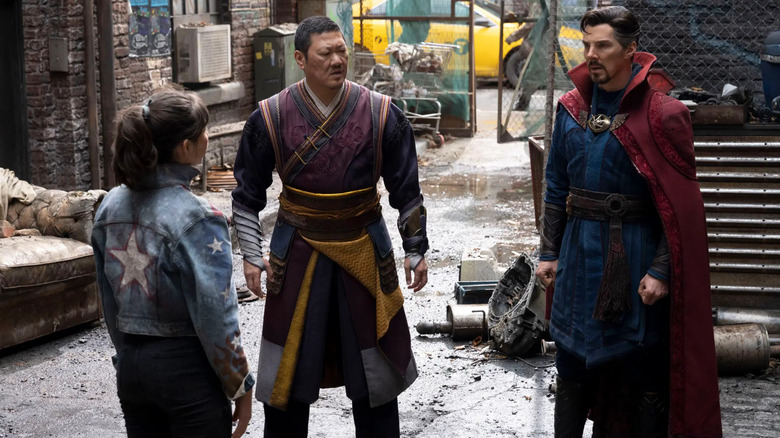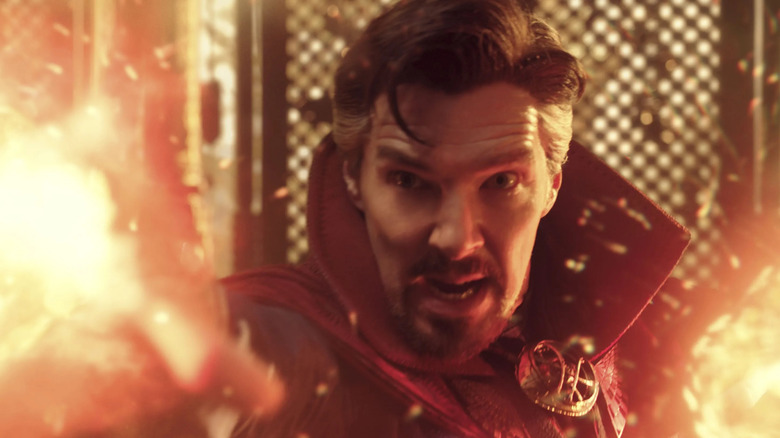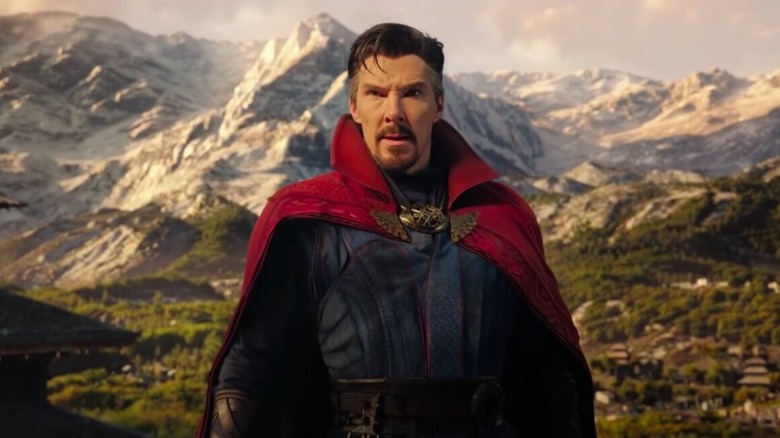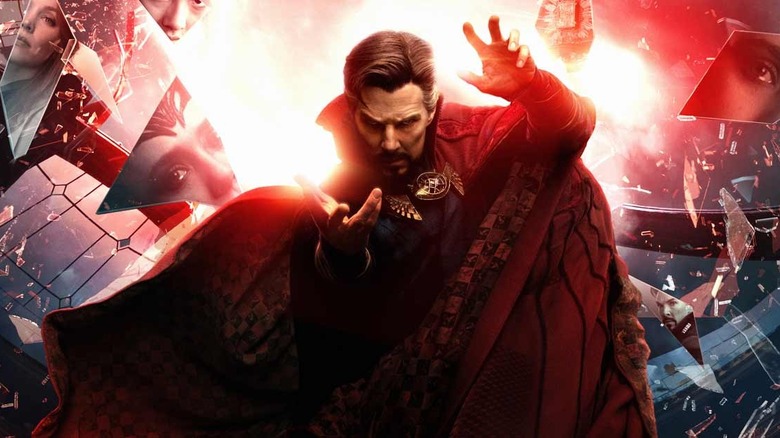Doctor Strange 2 Writer Michael Waldron Is Not Tired Of Talking About Doctor Strange [Interview]
I spoke to "Doctor Strange in the Multiverse of Madness" screenwriter Michael Waldron during the end of a very long press day, where he should've been too tired to talk about the Marvel Cinematic Universe. But the man seemed damn near indefatigable. "I've been talking about Doctor Strange for the last two and a half years," he told me. "Today could hardly push me over the edge."
And it's been a long, long couple of years. First, Scott Derrickson left the project. Then filmmaker Sam Raimi took the reins, bringing Waldron, a Marvel Studios veteran as the head writer of the "Loki" series, along with him. You know the rest: a worldwide pandemic, numerous delays, tales of reshoots. It's been a bumpy road, and Waldron doesn't sugarcoat the process of putting the film together. He compared the writing process to playing Frankenstein: "We just created a new body out of parts from the board."
Of course, greatness can be born from chaos, and Waldron felt he was able to turn that chaos into creative energy, citing his work on some of your favorite TV shows (including "Rick and Morty") as the boot camp that prepared him for the process.
Waldron is a gracious interview, tolerating my questions about "Loki" season 2 and his mysterious "Star Wars" project, telling stories of working with a legend like Raimi, and humoring my question about if the MCU and professional wrestling are really just the same thing.
'If we wanted to start over from scratch, what would our version of the movie be?'
How tired are you of talking about Doctor Strange today?
No way. I've been talking about Dr. Strange for the last two and a half years. Today could hardly push me over the edge.
Yeah, but still I'd be like, "Oh great, another white guy with a beard to ask me Doctor Strange questions."
Listen man, I'm honored. I'll talk about it all day. The multiverse, how does it connect to Loki? Whatever you want to ask. All the questions I can't give you straight answers to.
What's the question you're hoping people will ask that hasn't been asked yet?
I'm hoping people ask about my cameo in the film.
All right. Where's your cameo in the film?
It's... You may have already seen it. If you saw the first 15 to 20 minutes, I'm in there.
Are you running in terror or are you participating in an action scene? What's going on?
I'm stepping out onto the balcony with Rachel McAdams' character, Dr. Christine Palmer and her new husband. I step out next to them drinking a martini. And the backstory that I wrote for myself is that I was his best man at the wedding.
Sam Raimi's extras are incredible. You watch the Spider-Man movies and they have the best reactions, the best physicality. People have GIF-ed the hell out of Sam Raimi extras. Did Sam Raimi direct you as an extra?
Yes. Yes. Sam directed me there in that case. I mean, everything in frame Sam is the artist of. And so, certainly his focus is on the performance of his principal actors, but he's all about rendering a certain kind of portrait in frame. But no, I had the pleasure of being directed by Sam to look at a giant octopus destroying a city and try not to embarrass myself in front of Rachel McAdams.
I feel like "Rick and Morty" must be an ideal training ground to write genre stuff. The science fiction concepts are sound, but they also need to serve the show's humor. Was that show as ideal of a training ground for writing Marvel as I imagine?
Totally. It was the perfect training ground. Because every week in that show, we take a big sci-fi concept that frankly you could probably write a movie about, you could write some kind of high concept spec about at least, and we basically blow it apart in the first five minutes of the show. Really, you've got to explain it to the audience quickly and then shift it to the background so they can get swept up in the adventure, in the rest of what's just a 22 minute episode. And so "Rick and Morty" trained me in how to introduce these big sci-fi concepts in ways that were digestible, palatable to the audience and without getting them bogged down in the boring details.
I imagine that the pace of a TV writers room prepared you for the "Doctor Strange" experience. Where it's no secret that you were handed a project that was between directors. Did it feel like emergency surgery?
Well absolutely, the television background between "Rick and Morty" and "Community," kind of creating out of chaos; sets you up well for working on any project this big, with this many moving parts. I wouldn't even call it surgery so much as I would call it, getting rid of one body, and pulling... And maybe it's a Frankenstein. It's not even that. We just created a new body out of parts from the board. And there was a version of the story that existed as Sam and I came on. And when Covid came down and delayed us several months, it gave Sam and I the opportunity to say, "all right, well, now we have the time. If we wanted to start over from scratch, what would our version of the movie be?" And Marvel was fortunately very supportive of that. And he and I set to work and kind of created our own thing.
'The MCU is just another version of Kayfabe.'
Sam Raimi has a certain level of expectation in your head. You hear that name and you go, "Oh my God, the movies he's made." What he's like as a collaborator?
Working with Sam is, I can't emphasize it enough, it has been the great pleasure of my life and career. It is a meet your heroes situation, just the absolute dream collaboration. He's as generous of a collaborator as I think I'll ever work with. So we've had a blast. Sam is a master conductor, at hearing your ideas and synthesizing them into his vision for what the movie should be holistically. And so we had a great time. I would say that our meetings over zoom, breaking the story and everything felt a lot of ways, like a writer's room. And it felt like the perfect collaboration between writer, showrunner and director, and it was just a blast.
There's a lot going on in this movie. There's Doctor Strange himself, but there's the returning cast, there's new characters, there's going to be cameos and twists and surprises. Were there certain points of the writing process where you had to step back and say, oh, wait, wait, Doctor Strange is the title of the movie. It's a Doctor Strange movie. Let's get back to him.
Not too bad, fortunately, only because we were always afraid. We knew from the get go that would be a trap, if we got to the point where we had derailed ourselves from making a Stephen Strange movie that we were in trouble. And so that was always top of mind for us, as we were breaking the story, as we were realizing the madness of the multiverse. It was only cool to us if it informed the journey of our hero. And that was our North Star the whole way through.
Were there any major Marvel lessons your learned from Loki that you brought to this one?
Well, I think it was maybe just my experience working with Marvel. I think my first drafts of the Loki script, I intimately wrote out every action beat in every fight or action sequence only to see for the most part, a lot of them get thrown out because then they bring on great storyboard artists who are much better at choreographing action than I ever could be. So in this case, I didn't waste a week trying to map out a Dr. Strange battle against a giant octopus. I just kind of hit the big beats and trusted that our amazing artists and stunt teams would really realize those sequences.
I think some people on both fan bases may steadfastly refuse to acknowledge it, but I'm convinced that Marvel universe, and the world of professional wrestling follow the exact same rules. And since you also worked on Heels, do you agree that Marvel universe and wrestling are pretty much the same thing?
Well, I mean, yes. I guess I'm curious about your theory what are you talking about specifically?
Oh, just the flexible reality of heroes coming back, villains becoming heroes. The increasingly complex soap operatic storytelling. Everybody has a superpower. Everybody can reinvent themselves.
Yeah. Absolutely. I was, I've talked about it before growing up. I was not a comic book kid. I was a pro wrestling fan. That was my mythic storytelling that I consumed obsessively, but it is absolutely adjacent to the world of superheroes. It is superheroes. And yeah, the MCU is just another version of Kayfabe.
I don't watch wrestling, but I know enough about it from my friends to know that there's an alternate universe where I became a wrestling fan instead of a Marvel fan.
It's totally the same thing. Down to the deep love that I have for much lower tier wrestler side characters that weren't around for very long; very much mirrors the love that my comic book geek friends have for little side characters that showed up in one Fantastic Four issue one time, 20 years ago.
'I feel like I'm getting to write all my dream characters.'
Speaking of side characters, I know you can't talk about spoilers or major plot details, but when it comes to writing in certain characters or certain actors, is it better to ask permission or forgiveness?
Forgiveness is at least my approach. I always step on the gas, write the craziest stuff I can possibly imagine and hand it in and see have I gone too far? And I think that's how they like to work. And you never know, something you write in there that seems insane, a year later, you find yourself on set shooting it. And you think, "wow, I'm glad I didn't pull my punches."
Can you talk about "Loki" season 2 at all? Are we in for a major reinvention or is this a case of something not being broken, so why fix it?
Time will tell. I think that's just my stock answer. I think that in the same way that with season 1 of "Loki," we said that we wanted to explore new ground with this character, season 2 in the same way. What are the new stories that can be told with "Loki?" And there's an amazing creative team in place. ["Moon Knight" directors] Benson and Moorehead, the directors, Eric Martin serving as the head writer. So it's a tremendous team, and I'm still lurking around part of it. So I think it'll be great.
Speaking of things I know you can't talk about ... what do you personally find exciting about the Star Wars universe?
Everything. I think the sheer canvas for Star Wars is quite literally all of space and all of time. Is where you can tell your stories. And so there's just infinite possibilities there. And I guess I just... I don't know. I love Star Wars. That's not a very original answer, but I'm excited to be working in that world.
Do you have a dream Marvel character? Somebody maybe in your research for this movie or "Loki" where you said, "I would drop everything to write that character."
I would say that I'm getting to, I feel like I'm getting to write all my dream characters. So, right now I feel pretty pleased.
"Doctor Strange in the Multiverse of Madness" hits theaters on May 6, 2022.



